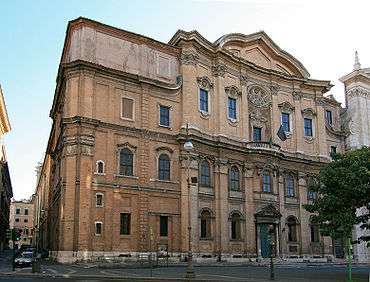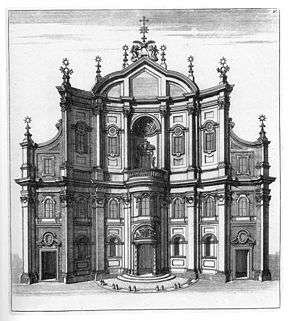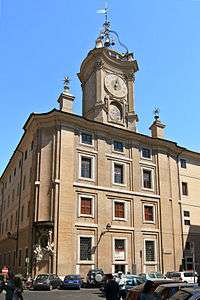Oratorio dei Filippini



The Oratorio dei Filippini (Oratory of Saint Philip Neri) is a building located in Rome and erected between 1637 and 1650 under the supervision of architect Francesco Borromini. The oratory is adjacent to the Chiesa Nuova Santa Maria in Vallicella, the mother church of the congregation. In front of the two sides was a small closed square, now integrated in the Corso Vittorio Emanuele II.
History
The congregation of the Filippini already had one of the most well-decorated Baroque churches in Rome, and the order had planned to build an oratory, as well as residential quarters, adjacent to the church of Santa Maria in Vallicella (Chiesa Nuova) located in crowded central Rome. Borromini won a competition for designing the structure against many including Paolo Maruscelli. He was employed in the task for 13 years, often a testy process. By 1640, the oratory was in use, and by 1643, the library, called the Biblioteca Vallicelliana, was complete.
Description
The striking facade adjacent to the church entrance has little regard for the structures behind. Inside the oratory is articulated by half columns and a complex rhythm of pilasters.
The facade provides a summary of Borromini's characteristics of innovations style, both austere and technically rigorous. The main body is divided into five parts by pilasters following a concave curve. In the central part, a dialectic set appears between the lower level, whose curve moves outward. At the top, the tympanum, created for the first time after an mistiligne angle, accentuates the both curved and angular movement.
At the corner of the oratory, on the Piazza dell'Orologio, Borromini raised a turret with a clock (1647-1649).
In the staircase leading up to the library one can admire the full scale plaster models of Alessandro Algardi's reliefs of The Encounter of Attila and Pope Leo (the finished marble is in St. Peter's Basilica) and The Miracle of Saint Agnes (executed by Algardi's assistants Ercole Ferrata and Domenico Guidi; the marble version, destined to become the main altarpiece in Sant'Agnese in Agone was never made).
Bibliography
- Anthony Blunt, Vita e opere di Borromini, Laterza, Rome-Bari, 1983
- Paolo Portoghesi, Francesco Borromini, Elemond-Electa, Milan, 1990
- Joseph Connors, Borromini and the Roman Oratory, Style and Society, MIT Press, New York and Cambridge, MA, 1980
| Wikimedia Commons has media related to Oratorio dei Filippini (Rome). |
| Wikimedia Commons has media related to Francesco Borromini. |
Coordinates: 41°53′54″N 12°28′07″E / 41.898228°N 12.468710°E